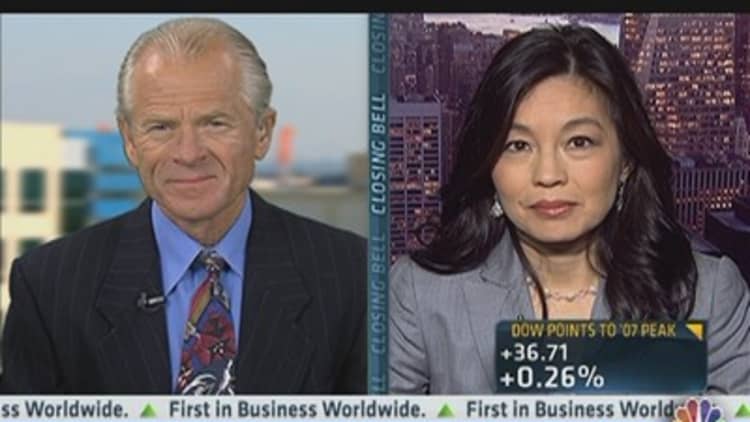China's slowing property market poses the most substantial macro risk to its economy in the coming quarters, analysts at JP Morgan said.
If real estate investment were to slow another 5 percent, it could shave 0.6 percentage points from China's already-flagging gross domestic product growth rate, according JP Morgan analysts. However, the risk of an actual house-price collapse remains limited as the authorities still have room for policy adjustment, they added.
Read MoreDefault risks trigger fresh fears over China property market
"A housing market adjustment may pose the biggest macro risk in China in the coming quarters, mainly via a slowdown in real estate investment and a decline in land sale revenues," the analysts said.
China's property market has turned a corner this year after government-imposed restrictions successfully cooled the previously frothy market.
After a bumper 2013 home sales in the first four months of 2014 fell 9.9 percent in value terms versus a 26.6 percent rise in 2013, JP Morgan's data showed. Meanwhile, home inventory in China's ten largest cities increased from 10 months' sales at the beginning of the year to 17.7 months in April.
Read MoreChina's property shows further signs of easing
Furthermore, the number of cities that reported price declines in April rose to 45 out of 100 from 37 out of 100 in March, the most since June 2012.

Other economists said China's housing market slowdown was purely cyclical.
"While all these indicators appear to have pointed to a slowdown in China's property market, we do not think they foretell that China's housing market is about to collapse," said Li-Gang Liu, chief economist for Greater China at ANZ.
"China's property market is experiencing a cyclical slowdown, which is normal and has occurred repeatedly in the past economic cycles," he said, adding that China's urbanization process would continue to fuel demand.
According to JP Morgan, China's current property market issues are similar to the problems it faced in the first half of 2012 - mainly excessive oversupply. However, this time the economic impact could be more severe.
This is because oversupply is more broadly based and, in some cities, more acute, the analysts said, while affordable housing is on a longer-term downtrend and is unlikely to cushion weakness in the private housing market.
Read MoreWho's afraid of China property prices?
JP Morgan expects housing market activity to decline by 2 percent in 2014, marking the first year of price declines on record.
Their outlook varies across different parts of China, in tier-1 cities, house prices will rise 5 percent, while in tier 2 cities where there is less supply, house prices should remain flat, and in tier 2 cities with more severe excess supply, prices could drop 10 percent. Finally tier 3 cities could see 5 percent price declines.
China's tier system ranks cities on their population size, services standards and stage of infrastructure.
JP Morgan is less concerned about the financial risk associated with a slowdown in China's housing market, which many other economists have flagged. It expects the macro channels will play a much more important role.
"The Chinese financial system is less exposed to housing than commonly believed," the analysts said.
This is because Chinese financial products are relatively simple, they argued. If housing prices were to collapse, it would most likely put a drag on economic growth rather than cause a severe financial system distress.
Read MoreUrbanization plan could further cool China property


